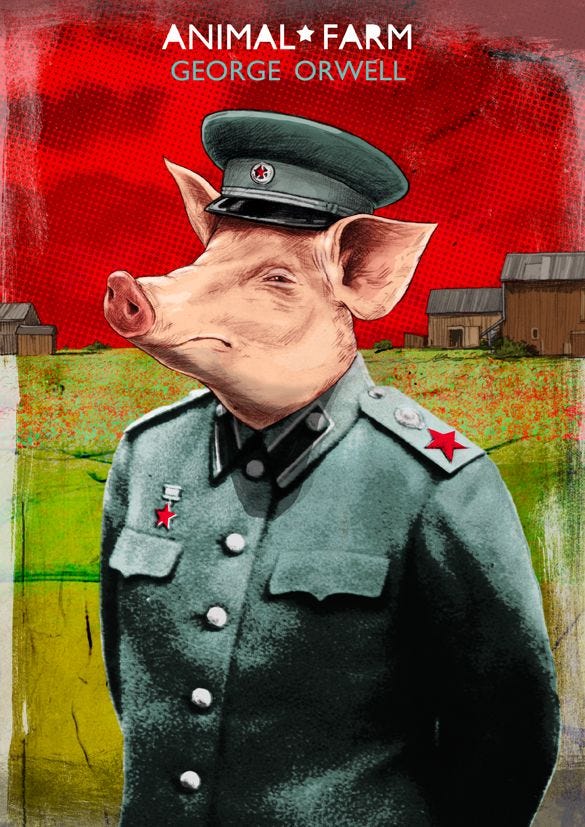Animal Farm Book Review
by Shoray Singhal
“All animals are equal, but some animals are more equal than others.”

George Orwell’s Animal Farm is an excellent 112-page novel that embodies the proverb “Don’t judge a book by its cover” because at first glance it might seem like a children book but in reality, it is a deep allegory to Stalinist communism which was prevalent at the time of its publishing. The legendary writing style of Orwell is present throughout which he later on continued in his later works like the timeless classic 1984.
Set in the countryside of England at a small Animal farm the novel follows a group of animals who are fed up with being enslaved and decide to seize the farmer’s land and create a co-operative that reap the benefits of their combined labors (A clear analogy for communism, in the book they call it Animalism). They devise 7 commandments of Animalism and vow to follow them at all costs but as time goes on and corruption rises among the animals these commandments are played with and then abolished altogether.

Sometime after the animal revolution the pigs slowly rise to power using their cunning and intelligence and convince other animals who worked day and night in the fields to allow them to go labour free. On top of that they start directly offending the 7Cs and even start modifying them to their whims. The slow ironic twist from the original purpose of the Seven Commandments, which were supposed to keep order within Animal Farm by uniting the animals together against the humans and preventing animals from following the humans’ evil habits, demonstrates how simply political dogma can be turned into twisted propaganda meant to favuour someones ambitions which in the case of the animals were the pigs. One pig in particular named Napoleon declares himself the premier of Animal farm and starts manipulating facts to his favour, killing rivals and subjugating other animals through his propaganda and militia.
“I trust that every animal here appreciates the sacrifice that Comrade Napoleon has made in taking this extra labour upon himself. Do not imagine, comrades, that leadership is a pleasure! On the contrary, it is a deep and heavy responsibility. No one believes more firmly than Comrade Napoleon that all animals are equal. He would be only too happy to let you make your decisions for yourselves. But sometimes you might make the wrong decisions, comrades, and then where should we be?”
Years pass and Animal Farm expands its boundaries after Napoleon purchases two fields from another neighboring farmer. Life for all the animals (except the pigs) is very harsh. Eventually, the pigs begin walking on their hind legs and take on many other qualities of their former human oppressors. The Seven Commandments are reduced to a single law: “All Animals Are Equal / But Some Are More Equal Than Others.” The novel ends with the pigs sharing drinks with the humans and Napoleon sitting in a chair wearing dashing clothes while selling the labour of the other animals to the human farmers.In this way the story comes full circle and the animal farm goes back to the state it was in before the revolution.
The novel is very well written and presents an easier way to digest and understand communism without the need of learning and processing the knowledge of Communist History. It helps the reader to understand the downfall and misconceptions of communism and why it ultimately failed, and who caused and connected what issue in communism.It is a book that anyone could and should read…
Truly deserving of the title “Orwellian”